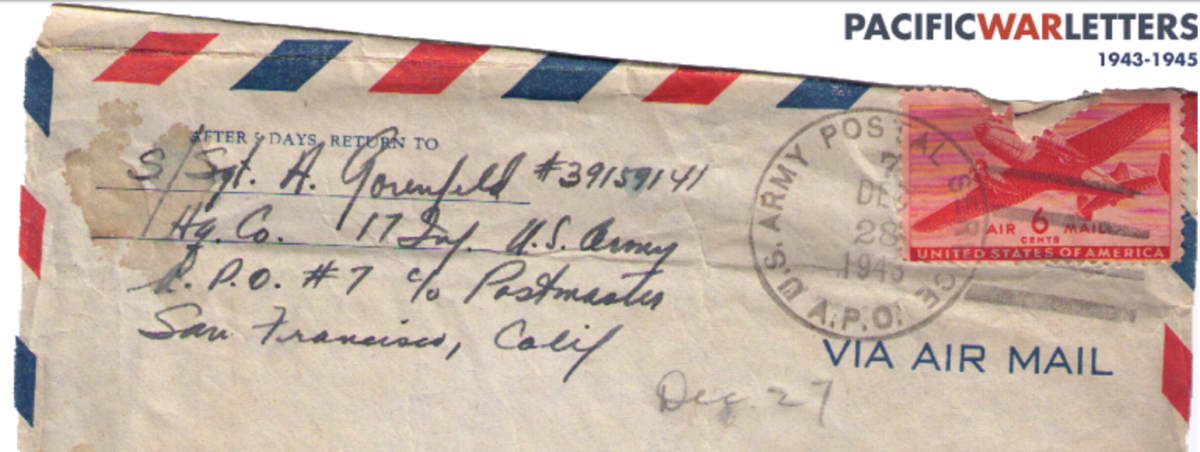Yes I’m still in a very happy mood after receiving all of those letters from you. But mail call has its sad interludes. Some names are called, and there is no answer. There never will be an answer. Always there is a moment of silence — a brief memorial — before the mail call resumes. There are packages, too, in such bad condition after the long search for the owner, that it is impossible to return them to the sender. One of these packages was turned over to me to be distributed to the men. It was full of all kinds of good things, put there by loving hands — with loving thoughts. A little note was wrapped around one of the candy bars.
I carried it up the hill to where we live. The men were gathered there—playing cards, reading, talking and joking. The soft light was gradually dimming in the cold, grey sky.
“This belongs to Johnnie,” I started to say. There was a complete silence. All activity ceased. The men appeared as statues of grey marble — faces expressionless. Then a single thought seemed to run through all. One of them picked up a shovel, and we went outside.
Carefully, I lowered the package into the earth and waited until it had been covered. We returned to our shelter. Activity had resumed, but men’s minds were on the other things. I know mine was.
Memorial Days will be celebrated in the future. The stadiums will be crowded, flags will fly, and bands will play. There will be eloquent speeches and impressive ceremonies, but my mind will go back to this single little incident and others like it. It will always mean more to those who were there than all the formal ceremonies of the future.
Some day I think I shall write a story of the “Good Earth.” Unlike Pearl Buck’s story, it will tell of soldiers and the foxholes which protect them from the bullets and cruel, jagged pieces of shrapnel that seek to maim, kill and destroy them.
The first thing a good soldier does is to dig a foxhole. No matter how tired or weary he may be, he knows he must dig. It may mean the difference between life and death. Many times I have been so tired that I could easily have fallen asleep in the snow or rain, but in the end I always found the hidden reserve of energy needed to dig, and the deeper the better.
Never have I known such fatigue as comes after hours and hours of ceaseless march over mountain peaks so steep and treacherous that a single false move meant disaster. But there was always the time and energy needed to dig a foxhole. I remember one occasion very distinctly. It was very late —about one o’clock in the morning. I was so tired that I felt I could not move even if the whole Jap army had attacked. Yet a few moments later I was at work digging. At the head of my foxhole was a huge rock. I had chosen the place because the rock afforded such good protection. The job was done, and I sank into the hole—completely exhausted.
The next morning, I was awakened by the terrible scream of Jap artillery. It had started about a half an hour earlier and already there were a few casualties around me. I happened to notice the rock more closely. It was shaped like a tombstone. I felt like I was in a grave, but in this case it had been a guarantee of life.
HEY! Snap out of it! Don’t be depressed. I thought you might be interested in some of the depressing realities of war, but just as real are the beautiful things to be seen here. Not the least is the country itself. It is terrible, awe-inspiring almost, and yet most beautiful. Rather than run into trouble with the censor, I won’t go into detail, but must tell you about the little waterfalls. High up in the snow-covered peaks, the tops of which disappear into the fog and mist, like the mountains of Shangri-La, the processes of life are taking place. There are born the streams and waterfalls that delight the eye of any nature-lover. Many times I have been high enough to locate tremendous snow masses which give them birth. Emerging from the mother snow, they cascade and tumble over a never-ending terrace of grey-green granite and volcanic rock. Here and there in their dizzy descent to the valleys, little pools are trapped, full of icy, crystal-clear water. I have never passed such places without stopping to drink, even when I was not thirsty.
Then there are the birds— delightful little creatures. Whistling and singing and totally unconcerned with the destruction over which they fly with effortless grace. There is one in particular that has always warmed my heart. It is one of the tiniest, completely snow-white except for its black wingtips. Often during lulls in the battle, they would come flying over, whistling their cheerful tunes. I would close my eyes and imagine that I was in a park. Not for long, however, for the demands of war are stern and unrelaxing. What a strange and powerful contrast.
